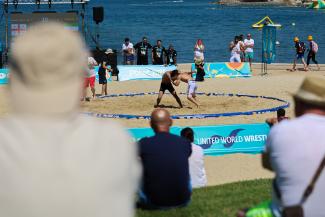Chudyk Leads as Ukraine Captures Three Gold at #WrestleDortmund
Thursday, July 1, 2021 - 14:35 By Vinay Siwach

DORTMUND, Germany (July 1) --- Ukraine women made a stunning start to their campaign at the junior European Championships in Dortmund, Germany as they won five medals on Thursday. After entering four in the finals and one in the bronze medal bout, three returned with gold, one with silver and remaining one with a bronze medal.
Five women's weight categories – 50kg, 55kg, 59kg, 68kg and 76kg -- had their medal bouts Thursday at the Helmut-Körnig Halle which is out of bounds for the spectators.
Led by U23 European champion Oksana CHUDYK (UKR), Ukraine's gold rush took them to top spot in the title race. They have 110 points, 30 more than second place Russia.
Chudyk began from where she had left at the U23 Euros in Skopje, North Macedonia in May. Over her three bouts in Dortmund, she gave up only one point, outscoring her opponents 22-1. In the final against local wrestler Sophia SCHAEFLE (GER), Chudyk started on a slow note with no wrestler breaking the tie for the first minute.
But once the Ukrainian found an opening, she scored via snap downs and counters, leading 4-0 at the break. Schaegle tried to lunge and reach for Chudyk's leg on multiple occasions but the latter was smart enough to keep the distance. The lead had doubled to 8-0 with 34 seconds to go in the bout and she finished with a takedown on the edge to win 10-0.
The two-time cadet world bronze medalist added to her cadet European and junior European title which she had won in 2018.

Another cadet world medalist and European champion Yulia LESKOVETS (UKR) captured the gold medal at the 59kg weight class. Leskovets, a silver medal at the 2019 cadet Worlds, had to work hard for the gold against Anna SZEL (HUN), also a silver medalist at cadet Worlds in 2018.
Szel looked set for her first junior Euro title as she led 4-2 going into the final minute of the bout. She won the first point for Leskovets' passivity and then a double leg along with a warning for the Ukrainian made it 4-2. But Leskovets kept the pressure up and got a takedown before exposing Szel with a bent leg turk to make it 6-4.
She held on to that lead till the end of the time to win the gold medal. Szel was visibly dejected having given up the lead in the final minute and finish with a silver for the second time at the junior continental event.
The hat-trick of gold included a stunning pin from Aleksandra KHOMENETS (UKR) in the 55kg final against Roza SZENTTAMASI (HUN). This was the first of the two Ukraine-Hungary finals.
Khomenets had a dominant run in Dortmund as she won her two bouts via fall and the semifinal against Anastasia IANDUSHKINA (RUS) 10-0 before pinning the Hungarian.
Ukraine could have had their fourth gold medal but 2020 Individual World Cup silver medalist Liliya MALANCHUK (UKR) suffered a defeat at the hands of Polina LUKINA (RUS) in just two minutes.

Silver medalist at the 2018 cadet World Championships, Lukina countered a Malanchuk attack to get a takedown and then exposed her to lead 4-2, having given up a double leg early in the bout. But her moment came when she got the Ukrainian in a fix close to the danger zone and after a long struggle managed to pin her back to the mat.
Malanchuk had a dream run as she won her bouts without given up a point. She won two bout via technical superiority and one via fall before suffering the defeat in the final.
The final gold medal of the day was captured by Melisa SARITAC (TUR) as she hammered Daniela TKACHUK (POL) 11-0 in the 76kg final.
While the Polish wrestler tried hard to get her attacks going, she was outpowered by Saritac with the difference in strength given the Turkish wrestler the advantage.
All the points scored by Saritac were on counter attacks. She got five different takedowns in the bout plus a point for Poland's lost challenge.
The Ukrainian at this weight, Maria ORLEVICH (UKR) defeated Carla LERA CELDA (ESP) to win the bronze medal, ending a five-out-of-five day for her country.
Ukraine will look to maintain their perfect record on Friday as the remaining five of their wrestlers entered the finals, confirming atleast a silver medal.
Wrestling will continue with Greco-Roman action beginning in five weight categories apart from the women's wrestling medal bouts in Dortmund.

RESULTS WW
50kg
GOLD: Polina LUKINA (RUS) df Liliya MALANCHUK (UKR), via fall
BRONZE: Georgiana ANTUCA (ROU) df Gabija DILYTE (LTU), 5-2
BRONZE: Zehra DEMIRHAN (TUR) df Natallia VARAKINA (TUR), 5-0
55kg
GOLD: Aleksandra KHOMENETS (UKR) df Roza SZENTTAMASI (HUN), via fall
BRONZE: Anastasia IANDUSHKINA (RUS) df Elena IONESCU (ROU), via fall
BRONZE: Melda DERNEKCI (TUR) df Viktoryia VOLK (BLR), 12-1
59kg
GOLD: Yulia LESKOVETS (UKR) df Anna SZEL (HUN), 6-4
BRONZE: Anastasia SIDELNIKOVA (RUS) df Selvi ILYASOGLU (TUR), 10-0
BRONZE: Aleksandra WITOS (POL) df Agnes NYGREN (SWE), 10-0
68kg
GOLD: Oksana CHUDYK (UKR) df Sophia SCHAEFLE (GER), 10-0
BRONZE: Elizaveta PETLIAKOVA (RUS) df Nesrin BAS (TUR), via fall
BRONZE: Alina MIKLASHEUSKAYA (BLR) df Patrycja SLOMSKA (POL), 3-3
76kg
GOLD: Melisa SARITAC (TUR) df Daniela TKACHUK (POL), 11-0
BRONZE: Maria ORLEVYCH (UKR) df Carla LERA CELDA (ESP), via fall
BRONZE: Kseniya DZIBUK (BLR) df Maria SILINA (RUS), 5-2


Share your thoughts.
Comments